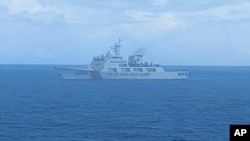Indonesia’s plan to site its naval combat squad headquarters on a tiny outpost far from Jakarta shows a commitment to push back against Chinese vessels that pass offshore as part of a festering maritime sovereignty dispute, analysts in the region say.
The squad's Jakarta headquarters will rebase in the Natuna islands, at a date not yet announced, so the navy can respond more quickly to incidents at sea, Indonesia’s navy chief of staff was quoted saying Nov. 23 by Radio Free Asia.
That squad enforces maritime sovereignty, including Indonesia's claims in the adjacent Natuna Sea, where Chinese coast guard vessels and fishing fleets periodically pass -- rankling leaders in Jakarta. The squad commander could “directly lead the battleships in the combat force there,” naval chief of staff Yudo Margono was quoted saying.
“In general, the idea is that if there is a potential regional conflict in which the navy’s combat activities and plans have to be activated, it would be around the South China Sea,” said Evan Laksamana, senior researcher for the Center for Strategic and International Studies research group in Jakarta, told VOA.
The squad operates four vessels and a CN-235 transport aircraft. Its relocation would fit with 15-year-old government plans for bolstering defenses on “strategic” outlying islands including the Natuna chain, Laksamana said. The 272 Natuna islands lie about 1,100 kilometers from Jakarta.
Indonesia’s navy has acquired more weaponry over the years and the coast guard vowed in September to step up patrols. Together they must scour the seas around 13,000 islands for terrorists, pirates and illegal migration as well as vessels from China and sometimes Vietnam.
Indonesian vessels including nonmilitary units have already expelled a list of Chinese ships from an exclusive economic zone extending as far as 370 kilometers out to sea from the Natuna chain.
In 2016, Indonesia contended with a string of incidents that crested in a standoff with China during an effort to arrest people aboard Chinese fishing vessels. Indonesia sent fighter jets in January this year to drive away Chinese fishing boats and coast guard ships. In September a Chinese coast guard ship passed through Indonesia’s exclusive economic zone until Jakarta’s Maritime Security Agency drove it off.
'Just following the trend'
Part of the Natuna Sea northwest of the islands falls within Beijing’s claim to about 90% of the wider, 3.5 million-square-kilometer South China Sea. Brunei, Malaysia, the Philippines, Taiwan and Vietnam contest Chinese claims to features in the fishing-rich, energy-loaded South China Sea that extends from the Natuna chain to Hong Kong.
China has the world’s third-strongest armed forces, ahead of every Southeast Asian country. Other claimant countries have modernized their navies and coast guards, sometimes with help from China’s rival, the United States.
“Most of the other countries have already been modernizing their naval forces anyway, so in a way Indonesia is just following the trend that’s already there before,” said Jay Batongbacal, international maritime affairs professor at University of the Philippines.
China probably will keep passing ships through the Natuna Sea even with the Natuna-based navy squad, analysts believe. The sea is rich in fisheries and has one of Southeast Asia's largest natural gas tracts, though exploration led by Indonesia some 15 years ago indicated that gas was hard to extract.
Chinese ships are collecting data above and underwater along routes popular with their adversaries, said Alexander Huang, strategic studies professor at Tamkang University in Taiwan. Those missions will boost pride among the Chinese before the 100th anniversary of its Communist Party’s founding, Huang added.
“They cannot show a sign of weakness at least before the Party centennial in July next year,” he said. “To celebrate the centennial, they have to show that they are brave, they are courageous, that they can take care of the claimed territory and waters.”
Shows of force at sea help China to negotiate from a position of strength with individual governments and the 10-member Association of Southeast Asian Nations bloc, Laksamana said in September. Indonesia is a bloc member with “considerable influence,” Batongbacal said.
In a May 26 diplomatic note to United Nations Secretary-General Antonio Guterres, Indonesia rejected China’s basis for its maritime claims. To defuse tension in September, Chinese National Defense Minister Wei Fenghe met with his Indonesian counterpart, Defense Minister Prabowo Subianto, in Jakarta.




